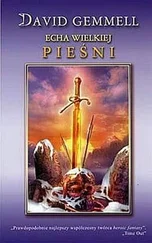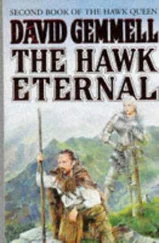'Is he dead?' she asked fearfully.
'No. Vorna healed him.'
'But… she has no powers now.'
'I saw her hold her hand over the poisoned ring, and ice formed under her fingers. The ring cracked and broke. I think she has powers still, Meria.' Gwen walked past the older woman.
'What are you talking about? Poisoned ring? What poisoned ring?'
'It doesn't matter,' said Gwen. 'Orrin is healed and well and sleeping. Let us leave it there. I am very tired.'
'I want to know what happened in that house,' said Meria, stepping in front of Gwen, who sighed and walked to the chair by the fire. She sat down and told Meria all that had happened, of how Orrin must have taken Ruathain's ring, and how he had looped it around his neck.
'Vorna thinks the poisoner planned for the ring to kill Connavar. It was a slow-acting poison, which is why it took so many months to kill my Ru.'
'I don't believe it was poisoned…' began Meria.
'Stop it!' said Gwen. 'I am not a fool, Meria. When that moonstone cracked open I saw the foulness that seeped from it. I could see then that the stone had been hollowed. As soon as it was removed from round Orrin's neck he strengthened and was quickly well. What you believe, or do not believe, is up to you. I know what killed my son. It was no-one's fault – save the murderers who intended harm to Connavar. No-one set out to rip Ruathain from the world. And I do not blame you for giving him the ring.' She rose from the chair. 'That is all there is to say – except that I shall be leaving tomorrow, with my sons. I believe Vorna when she says the raiders are coming. All who stay here will die, and I have seen too much of death lately.'
Meria stood very still, and Gwen saw the hardness ease from her face, and for a moment she regained a semblance of what must have once been great beauty. 'I stopped you from bringing Vorna to this house. I killed my grandson.'
'Not wittingly,' said Gwen. 'And I could have disobeyed you.' She left her there, and went to the bedroom. Badraig awoke as she entered. Gwen lifted him from his cot and held him close.
For Finnigal the new day was a continuing nightmare of frustration and near boiling anger. It had begun reasonably, with many of the refugees leaving their homes at dawn and harnessing their wagons. The first argument broke out within minutes, when Finnigal saw several people loading large chests onto the back of a wagon. He strode over and told them that only people and food would be leaving that day, since there were insufficient carriages. The man, an elderly Rigante merchant, berated him soundly, and refused to unload them. Finnigal tried to reason with him, but finally ordered two soldiers to remove the chests and carry them back into the house. The merchant, white-faced with fury, then refused to leave Three Streams, saying that if all his money was taken he'd be better off dead anyway.
And this was just the beginning. Rows broke out, and another refugee, a large Pannone woman, struck one of his soldiers. Finnigal did his best to calm matters, but – as he was all too aware – his nature was similar to that of his father, Fiallach, and anger was never far from the surface. Yet he struggled on, trying to do his duty, forcing himself to stay calm. After more than two hours, as the first of the wagons finally began the journey to the west, Finnigal's head was pounding. Then the rain came in a slashing torrent that turned the hillside to mud, and many of the heavier wagons became bogged down. People clambered from the wagons, slithering and sliding, slowly pushing them up the hill.
Finnigal, his mailshirt and clothing drenched, rain seeping under the iron neck guard and soaking his undershirt, trudged through the mud to the house of Meria. The Lady Gwen and her children had already left, and he found Meria sitting comfortably by a blazing fire, working on a piece of embroidery. 'Almost time to leave, my lady,' he said.
'Then leave. I shall not be travelling with you.'
Finnigal stood his ground. 'Your action is undermining my authority, lady. Hundreds of townsfolk are staying merely because you do. And if you stay then my soldiers and I must stay, which means there will be no-one to defend the refugees from outlaws.'
'Are you done, Finnigal?' she asked. 'For there is a mighty draught from that open door, and I have no wish to catch a chill.'
Furious, he turned and walked back into the rain.
By noon the storm had ceased, but the trail west had become a quagmire. Fewer than six hundred of the eleven hundred inhabitants of Three Streams had so far left the settlement and only twenty wagons remained. Many people were leaving on foot, carrying sacks of food and spare clothing. But more waited.
The sun broke through the clouds, momentarily lifting Finnigal's spirits, but the feeling was short-lived. People suddenly came streaming back down the hillside, dropping their provisions, shouting and waving. Finnigal removed his iron helm, the better to hear them. 'Outlaws!' he heard one man cry. 'Hundreds of them. Flee for your lives!'
Finnigal swore and shouted for his sergeant, a twenty-year veteran named Prasalis. The soldier came running from the direction of Nanncumal's forge. 'Gather the men,' ordered Finnigal.
'Here they come, sir,' said Prasalis, drawing his sword.
Finnigal strode out along the main street, past Eldest Tree, a colossal oak. He saw a man wearing a gleaming iron breastplate and helm leading the outlaws. The panic on the hillside eased as the advancing men showed no intention of attacking. Prasalis moved alongside his young captain. 'I make it a hundred and three,' he said. The Iron Wolves ran to line up alongside Finnigal, swords drawn.
The outlaws approached, and Finnigal found himself staring at their leader, open-mouthed. As he came closer he looked more and more like Connavar! It was uncanny. Even the eyes were the same, one green, the other tawny gold. There was no doubting who he was: the Bastard Bane. None of the outlaws had their weapons drawn. Even the archers had removed their bowstrings in a bid to keep them dry.
'What do you want here?' demanded Finnigal.
Bane smiled. 'Relax, captain. We are here to help you.'
'I need no help from a scurvy-'
Bane raised his hand. 'Say nothing more, captain,' he advised. 'Come, walk with me.' Turning away, Bane strode towards the forge. He did not look back to see whether Finnigal was following.
'If there's the first sign of trouble, attack them,' Finnigal told Prasalis. Then he moved after Bane, who was waiting by the forge fence.
'If you have come here to rob-'
'Shut your mouth, boy,' snapped Bane, 'and listen to what I have to say. There are two hundred Sea Wolves close by, and we have no time to bicker with one another. Now it is my intention to open Nanncumal's armoury and get mailshirts, swords and bucklers for my men. Then we will help you evacuate the settlement, and put ourselves under your orders for a rearguard. I have sixty bowmen, and forty other men who will fight with sword or axe. That gives us at least a fighting chance of protecting the refugees. You hear what I am saying?'
'I expect your price will be high for this,' said Finnigal. Bane's eyes grew cold and hard, and Finnigal felt the onset of fear.
'Aye,' said Bane, 'my price will be high. Now do you have a scout in the east?'
'Of course.'
'Then he should give us at least some warning when the raiders are close.' Bane scanned the settlement. 'Why are so many people still here?'
'The Lady Meria refused to leave. Others have followed her lead.'
'Is that so? We will attend to that presently. But first I will arm my men. Be so good as to advise yours to put away their weapons and continue with the evacuation.'
Finnigal reddened. 'Is this what you meant about putting yourself under my orders?'
Читать дальше












